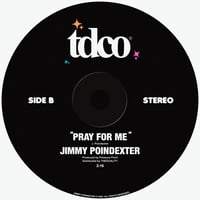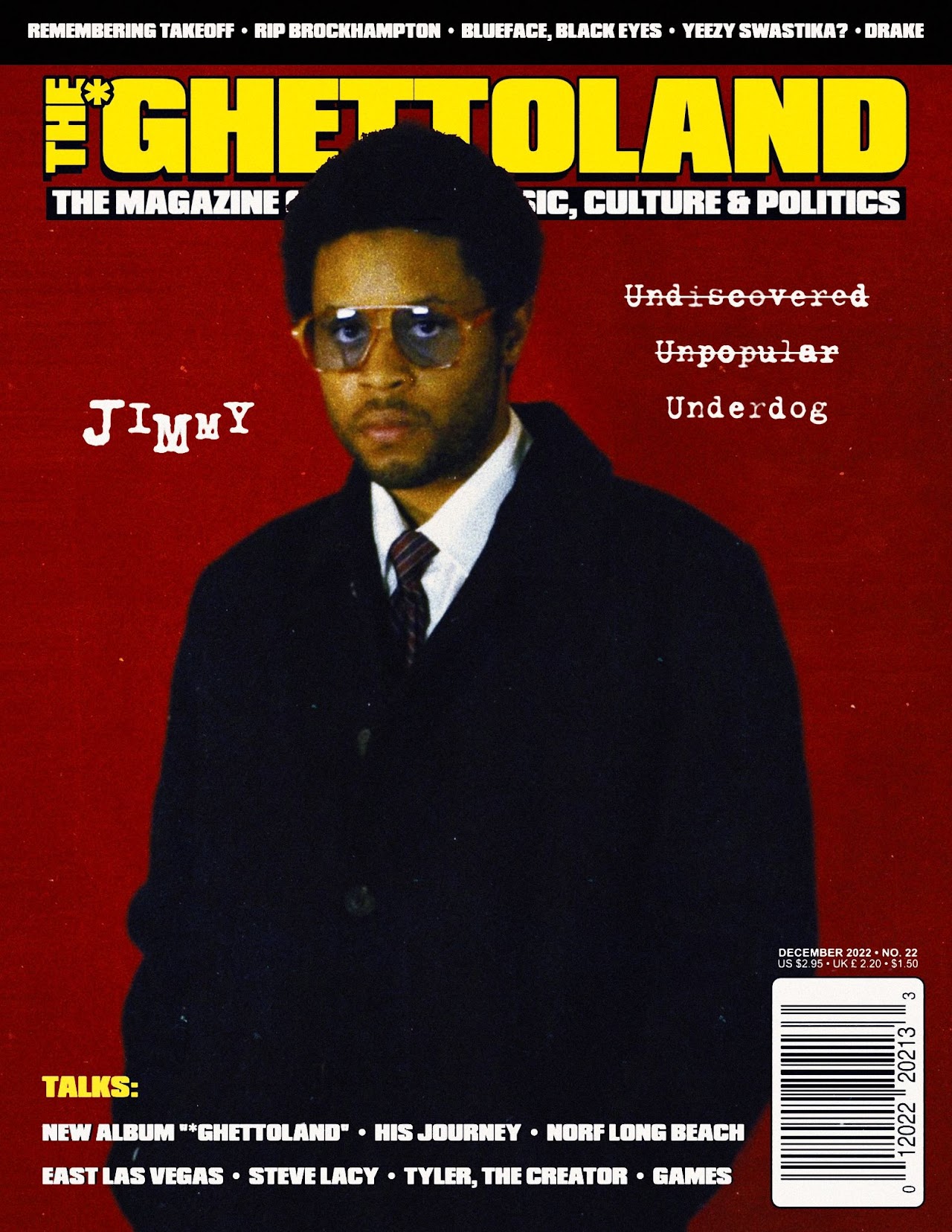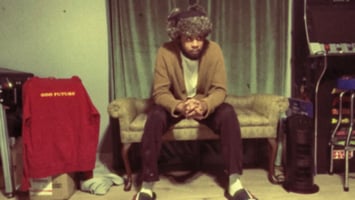
Admin
| GENRE: RAP | LABEL: THEDUALITY / Distrokid / Equity Distribution | REVIEWED: April 20, 2023 |
JIMMY is the product of what happens when an industry is so inaccessible that talent plays almost no percentage in your commercial success but your mentors are the ones who broke through, remodeled the previous "industry norms" and inspired you to do the same. The phenomenon of his recent success is exhausting in the sense that the vast majority spectating his rise, including him, knows where he belongs, however the current "norms" do not align with that assurance. Knee-deep in a Tik-Tok dominated era where almost everyone wants to do something more than work a "regular job," hope has never been so low and subsequently high. Chasing viral attention has been the new "Hollywood" for well over a decade now and as time, technology and the ownership of platforms progress, it seems to only become more difficult to break through the noise and earn a living from your work. Especially as an independent artist. More especially in the current saturated Hip Hop realm. Poindexter's latest trilogy of records echo these sentiments, providing installments of inspiration and empowerment to a generation of kids, young adults, boomers and beyond to pursue a life worth living for in a world where almost everything is designed to meet that mission with almost unmovable resistance.
JIMMY's freedom-focused follow-up to *GHETTOLAND is equal parts a diary entry, survival guide and product of rebellion, wrapped up in a jazz-inspired bow. JIMMY recorded Do What Makes You Happy in the car of his newly proposed to fiancée, letting the rain, loud neighbors and police sirens score the settings of these songs (all of which are credited on this album) following a period of public successes. Imagination & magic is it's vessel, independence and ownership is it's glue. The youth and America, among many others, is it's target. Oh yeah. And it was made in about less than a month.
This album calls upon music history with a special emphasis on raw, real life sound and emotion— "I don't care what the genre is, is the music good?" is it's attitude. Even though he's been very vocal about the Blog Era's influence on his genesis, even traces of Tupac Shakur make an appearance throughout the project's lyrical performances. Probably due in part to Poindexter's west coast influence being from North Long Beach, California and having a parent from Compton. Whether he's personifying America and the idea of fame while crooning over dramatic and suspenseful production on "American Dream." Or firing off aggressive and blood thirsty rap verses over a reimagined MJG & 8Ball's "Top of the World" instrumental on "Heavyweight," JIMMY is still able to balance theme, influence and vibrant production in a precise and effortless way.
JIMMY, on a very low budget and making the best with what he has available to him, utilizes the production and spirit of the music he truly wishes to create to get his points across without friction or misrepresentation. When asked about the conceptual feeling of this album, JIMMY makes it clear the mentality is bred from the Richard Pryors and Roger Prince Nelsons of the world, through the musical production scope of the Quincy Joneses and Stevie Wonders with a post-Odd Future Tyler (or Frank) and Donald Glover bold anti-establishment attitude. It contains almost no evidence of being released in the same era as the rage rap movement that quickly rose shortly after Whole Lotta Red by Playboi Carti was released just before the top of 2021. The jazzy production and encouraging lyrics are liberating. Something that's been rarely found in recent years of mainstream Hip Hop. This is also responsible for JIMMY sticking out like a sore thumb in an internet Hip Hop realm dominated by the Yeats and Ice Spices of the world.
Whereas his previous record *GHETTOLAND focused on sparking the abstract thought of a "different place with different rules," JIMMY shifts the focus on concrete action in a setting almost as saturated as the notably orange album cover artwork is. Poindexter places the magnifying glass on fragments of Jazz, Soul, R&B and Hip Hop to get his message across in just under an hour. Deciding a familiar urban setting was the best environment for his message to live in and to be more accessible to a world beyond "the ghetto," JIMMY flexes being a product of his disadvantaged past and how he made it his "superpower" over a grandiose soul chop; only to follow it up with a R&B beat switch on the tail end of "Lone Soldier." He honors all the "beautiful souls he knows" as he professes his love for his fiancée and speaks to interracial themes on "Fly Away" over a Jazz sample that sounds straight out of the score for a wedding. He also carves out time to have some fun of his own within the context of the album with "Reparations," a less than one-minute heavily Baby Keem-inspired track where he adopts the high pitched voice, brief stanza'd rhyme patterns and absurd deliveries as he raps about his excitement in the possibility of reparations being distributed soon in California. He finishes this track with "Alright, let me stop playing. I've had my fun" aware of the fact the placement of this song on the tracklist is almost solely for his enjoyment before being abruptly cut off by the Invincible era Michael Jackson-inspired track "End of the Night."
Knowing he's mostly unknown to the masses, JIMMY reveals new layers of his own life once again, showing the work of his journey to this innate feeling of passing out freedom down the streets of America in the lyrics of tracks like "The Torch," "Good Thing," "Roots," "Monarch" and "Loved Ones." Tackling the cycles of generational trauma, poverty, pain, creative inspiration and world history on "The Torch," JIMMY delivers one of his most laser-focused and hungry verses over a beautifully fluid soul sample. Some one liners that standout on this one are "But how the nigga in the loafers talkin' street shit? Although I may not look it, I was born from it I've seen shit these niggas talk about in all they raps and they ain't seen shit!" or "I'm the product of two Gs/2Gs, so I'm trappin' off my phone."
The lead single "Loved Ones" puts JIMMY's deep relationship with his family members on full display with a self-produced visual that puts an image to a name. On "Good Thing" and "Monarch," we get a glimpse into JIMMY's journey through depression and transitioning from a "caterpillar to a butterfly," respectively. The performances on these tracks explore the brevity and level of vulnerability that can be traced back to it's roots of a certain Frank Ocean's discography. "Roots" is a snapshot of the past as JIMMY guides your tour through his hometown through the eyes of his younger self. "Looking like a baby [Allen] Iverson" and maneuvering through the heart of a not-so-safe city as a child who was into video games, playing little league football, skating to the park (but never the wrong ones alone) and eating liquor store Swiss Roll pastry treats like it was a delicacy, he paints a picture that resonates with Kendrick Lamar's character displayed on good kid, M.A.A.D City and is equal parts inspired directly by it.
On "When I'm Gone" and "Today," JIMMY questions his mortality and legacy. Following the upbeat feel-good track "End of the Night," these last two songs on the tracklist come off as a post-party existential crisis that end up being some of the most introspective and grounding tracks on the album. On "When I'm Gone," in reference to an older brother who survived a tragic black-on-black crime in which he was shot five times and legally pronounced dead on multiple occasions before pulling through, JIMMY raps "I asked my brother what the afterlife was like, he said 'dark.' There's your answer." On "Today," JIMMY sings "Do I really have to die to see your love for me? Would love to smell my flowers while I'm here, show love to me." Through it's many layers, Do What Makes You Happy is a reminder of this mortality and unpredictable fate we all share. It's also the drill sergeant yelling at you to jump out the plane trusting your instincts will kick in when they need to. As track thirteen, "Soarin'," places it: "You can do anything in the world, be anyone and go any where. You're one thought away from your destination."
Do What Makes You Happy ironically also displays a darker more cynical side of Poindexter's view on America, the world and even himself as he believes to reach our happiness, "sometimes we have to go through the darkness." On "Superstar," JIMMY communicates a more surreal view of fame where he now resents it altogether. Despite reaching new heights and even gaining the attention of Jay Z's Roc Nation associates, he finds himself more concerned with the lack of funds and freedom he currently wields highlighting that maintaining fame is more difficult than gaining it. On the standout track "Save The Children," he delivers an electrifying singing performance voicing his disdain for greedy and apathetic attitudes found in the "higher up" positions of America. On the first half and chorus of track eleven "Don't Care," JIMMY strikes an almost playful, straightforward and deadpan delivery detailing his desire to have fun and live a comfortable lifestyle with an emphasis on simplification. He finds time on the second half of this track to poke the bear that is Hip Hop stating that as far as he's concerned, your top five artists aren't a threat to him.
On "When I'm Gone" and "Today," JIMMY questions his mortality and legacy. Following the upbeat feel-good track "End of the Night," these last two songs on the tracklist come off as a post-party existential crisis that end up being some of the most introspective and grounding tracks on the album. On "When I'm Gone," in reference to an older brother who survived a tragic black-on-black crime in which he was shot five times and legally pronounced dead on multiple occasions before pulling through, JIMMY raps "I asked my brother what the afterlife was like, he said 'dark.' There's your answer." On "Today," JIMMY sings "Do I really have to die to see your love for me? Would love to smell my flowers while I'm here, show love to me." Through it's many layers, Do What Makes You Happy is a reminder of this mortality and unpredictable fate we all share. It's also the drill sergeant yelling at you to jump out the plane trusting your instincts will kick in when they need to. As track thirteen, "Soarin'," places it: "You can do anything in the world, be anyone and go any where. You're one thought away from your destination."
![TDCO LETTERS [NO SPACE]](https://newsroom.theduality.co/hs-fs/hubfs/TDCO%20LETTERS%20%5BNO%20SPACE%5D.png?width=500&height=238&name=TDCO%20LETTERS%20%5BNO%20SPACE%5D.png)

![DWMYH [cover smaller] DWMYH [cover smaller]](https://newsroom.theduality.co/hubfs/DWMYH%20%5Bcover%20smaller%5D.png)






